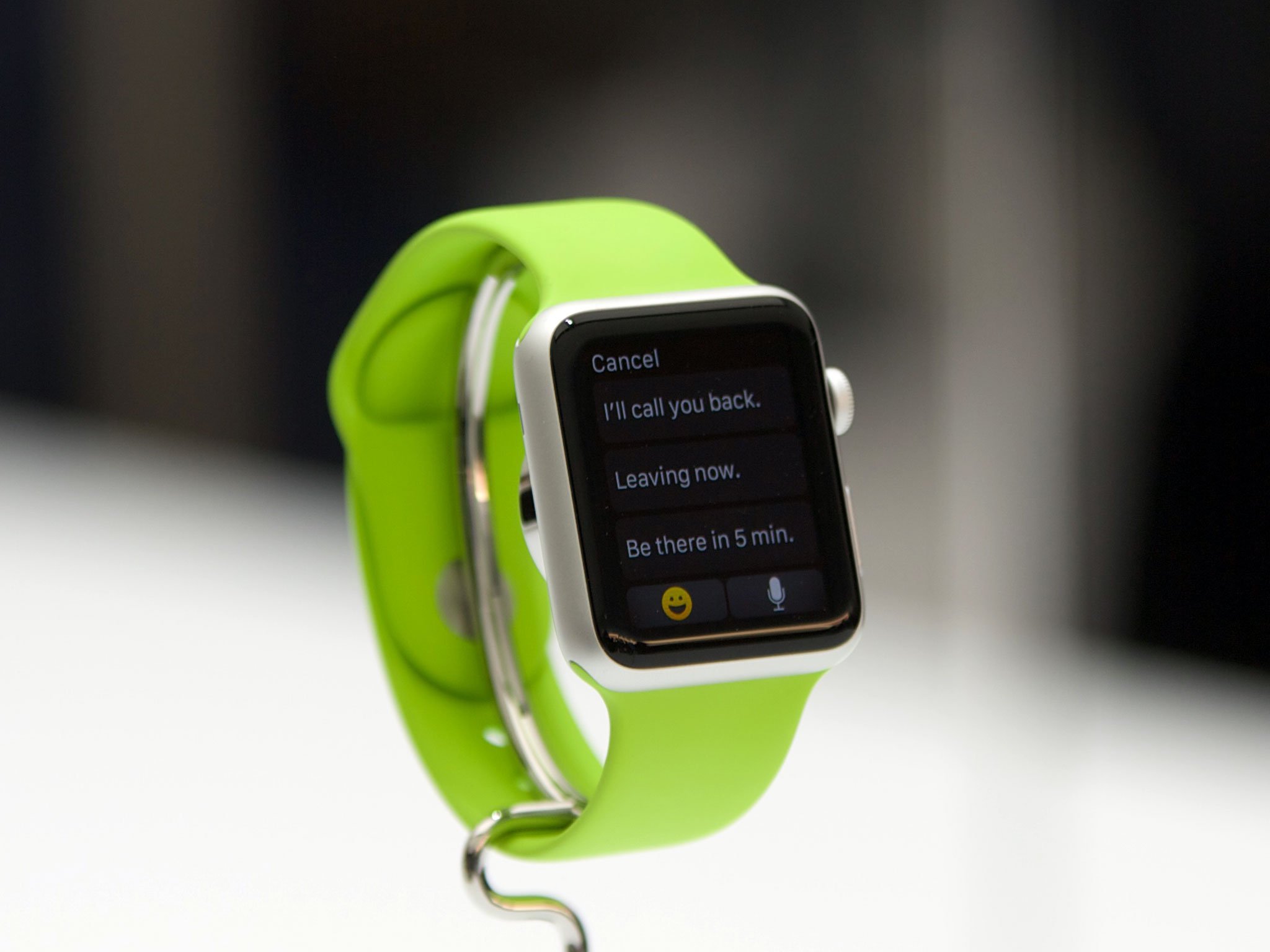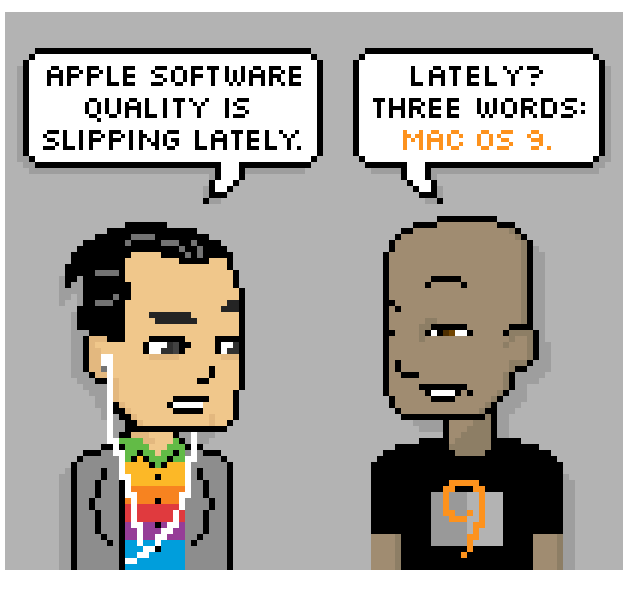Apple and the pain of platform transitions

The stability of Apple's platforms has been the subject of a lot of debate recently. Whether you agree with it or not, there's a growing sentiment that the quality of Apple's software has gone downhill in recent years, and that some form of "Snow Leopard moment" is needed to get it back on track. Our own Peter Cohen tackled the issue back in November:
Apple made the decision a few years ago to adopt an annual upgrade cycle for its operating systems. That's brought tremendous innovation to the Mac and to iOS in a relatively short amount of time, but it's also brought a lot of pain for users. Here's to hoping that Apple can iron out the problems with iOS 8 and Yosemite in less time than it took them to get us a reasonably stable release of Mavericks.
Marco Arment brought a ton of attention to it, and made some excellent points both on his show, ATP, and on John Gruber's The Talk Show, as did many, many others.
I also loved Rich Stevens' take on it in last week's pixel project comic:

It reminded me of something I wrote two years ago called Seeing Apple through rose colored blasters:
When it comes to perception over time, we often distort out own realities. We tend to forget a lot of the things that bugged us way back when, or at least remember them with far less visceral annoyance than what's bugging us now. We feel like the problems of the present, as yet unsolved, are worse than the problems of the past, many of which were solved just fine.However, as much as these things might hold our attention now, they're no more a sign of Apple losing their way than they were last year, or the year before, or the year before that.By all means be upset. Be powerfully, passionately upset. Advocate for change. Just keep it in context and perspective.
Being passionate and advocating for change is exactly what Peter and Marco were doing. Unfortunately, keeping it in context is what people re-blogging them often missed. Ashley Nelson-Hornstein, however, missed nothing:
Expressing concern for the platform is healthy; it means that we care. Personally, I won't be jumping to hyperbolic sentiments or joining in on the sense of foreboding doom wafting through the public discourse. I forgave iOS 7 because I understood the incredible amount of work accomplished to pivot the platform in just six months. So for me, iOS 8 is my first real opportunity to be concerned about the state of the platform, and not evidence of a pattern of issues. I'll be justifiably concerned and worried if the same software quality issues are being discussed in 10.11 and iOS 9. Until then, I'm willing to give Apple the time necessary to let their plans propagate.
On Daring Fireball, Gruber expressed something similar:
My hope is that the reliability issues we are seeing in iOS and Mac OS X in recent releases are largely the inevitable result of Apple going through numerous transitions simultaneously. Extensions, XPC, iCloud Drive, Continuity — these things require coordination between all three of Apple's platforms (mobile, desktop, cloud). That what we've been seeing the last few years is this decade's equivalent of the first few years of Mac OS X — rapid development and flux that precedes an era of relative stability and a slower pace of change. Let iPhone, iPad, and Mac settle in — and let the rapid change and flux flow through Apple Watch, CarPlay, a new Apple TV, and whatever else comes next.
For historical context, Gruber also linked a 2004 Ars Technica piece by Eric Bangeman about the last time Apple was caught in such an era:
Master your iPhone in minutes
iMore offers spot-on advice and guidance from our team of experts, with decades of Apple device experience to lean on. Learn more with iMore!
[Head of Apple software engineering, Avi Tevanian] conceded that Apple's current annual upgrade schedule "is not a sustainable rate. But you'll still see us going really fast," he said [and] rebutted comments that Apple had alienated some of its customers with the rapid pace of Mac OS X upgrades.
OS X 10.0 to OS X 10.5 included the transition from classic Mac OS to NeXT-based technologies, the adoption of Aqua, an entirely new interface and design language, and the switch from PowerPC to Intel. It also set Apple up for the current leap forward — increasingly light, increasingly power-efficient mobile devices.
That era was famously capped off by Snow Leopard, when Tevanian's successor, Bertrand Serlet, convinced Steve Jobs to let them spend the majority of OS X 10.6 tightening the screws on everything they'd done before. There was 64-bit, Grand Central, and OpenCL under the covers, but mostly there was a focus on refining projects that had already been put in place by Leopard. Marketing came up with the "no new features" hook, figuring going all-in was the best way through, and engineering, without even bothering with a wine name, made it happen.
What we're in now is another period of transition. iOS 7 included an entirely new interface and iOS 8, a major functional upgrade. OS X Yosemite included a bit of both. They also set Apple up for the next leap forward — increasingly decoupled, increasingly interchangeable end-points.
Take the Apple Watch by way of example. It's going to rely on extensibility so that the iPhone can project information and apps onto its screen. And because that screen is small, it's going to rely on continuity so it can handoff any activity that requires more involved interaction back to the iPhone.
Those technologies (or something like them) had to be in place for the Apple Watch (and other future devices) to ship. Sure, Apple could have taken longer to roll them out and they could have moved the watch from this year to next, but then we'd have spent another year hearing about how Apple was no longer innovating, how they were falling behind, and how they were doomed.
Instead, iOS 7, iOS 8, and OS X Yosemite shipped almost every major feature, and set up almost every new device, people had been asking for. The greater scope and scale meant greater turbulence, but it also promised greater rewards. So far the gamble has paid off with the big and bigger screens of the iPhone 6 and iPhone 6 Plus, but it will have to pay off again with the Apple Watch this spring.
Yes, there's been pain. It's arguable whether or not it's any more pain than last year, the year before, the year before that, the year before that, and so on. But it's inarguable that there's been pain. People at Apple know that. They and their families and friends use the same hardware and software we do. Whether or not the right people were paying attention to the right measures, recent events have at the very least made even those who might not have realized the sentiment aware of it now.
After all, what's a great leap forward without a great stuck landing?
Will iOS 9 and OS X 10.11 have as significant design and functionality changes? My guess is not. My guess is that, as in the past, we'll begin moving back into a phase of stabilization. Though my guess is that we'll still find a lot to — rightly — complain about.

Rene Ritchie is one of the most respected Apple analysts in the business, reaching a combined audience of over 40 million readers a month. His YouTube channel, Vector, has over 90 thousand subscribers and 14 million views and his podcasts, including Debug, have been downloaded over 20 million times. He also regularly co-hosts MacBreak Weekly for the TWiT network and co-hosted CES Live! and Talk Mobile. Based in Montreal, Rene is a former director of product marketing, web developer, and graphic designer. He's authored several books and appeared on numerous television and radio segments to discuss Apple and the technology industry. When not working, he likes to cook, grapple, and spend time with his friends and family.
